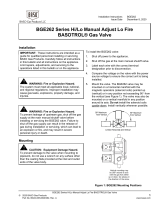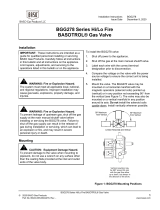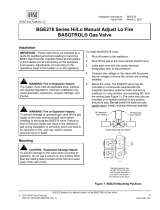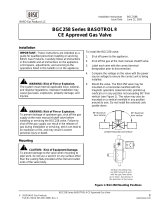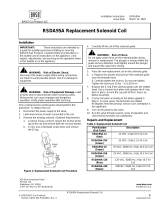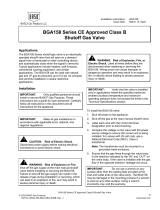Page is loading ...

Installation Instructions BGF378
Issue Date December 9, 2020
BGF378 Series Hi/Lo Solenoid Operated Lo Fire BASOTROL® Gas Valve
© 2020 BASO Gas Products 1
Part No. BASO-INS-BGF378, Rev. A www.baso.com
BGF378 Series Hi/Lo Solenoid Operated Lo Fire
BASOTROL® Gas Valve
Installation
IMPORTANT: These instructions are intended as a
guide for qualified personnel installing or servicing
BASO Gas Products. Carefully follow all instructions
in this bulletin and all instructions on the appliance.
Limit repairs, adjustments, and servicing to the
operations listed in this bulletin or on the appliance.
!
WARNING: Fire or Explosion Hazard.
The system must meet all applicable local, national,
and regional regulations. Improper installation may
cause gas leaks, explosions, property damage, and
injuries.
!
WARNING: Fire or Explosion Hazard.
To prevent leakage of upstream gas, shut off the gas
supply at the main manual shutoff valve before
installing or servicing the BGF378 valve. Failure to
shut off the gas supply can result in the release of
gas during installation or servicing, which can lead to
an explosion or fire, and may result in severe
personal injury or death.
Mounting
!
CAUTION: Equipment Damage Hazard.
To prevent damage to the valve when mounting to
pipework, do not use a wrench on any surface other
than the casting flats provided at the inlet and outlet
ends of the valve body.
To install the BGF378 valve:
1. Shut off power to the appliance.
2. Shut off the gas at the main manual shutoff valve.
3. Label each wire with the correct terminal
designation prior to disconnection.
4. Compare the voltage on the valve with the power
source voltage to ensure the correct unit is being
installed.
5. Mount the valve. The BGF378 valve may be
mounted on a horizontal manifold with the
solenoid coils pointed up (vertical) or in any
position not exceeding 90 from the vertical (see
Figure 1). The valve may also be mounted on a
vertical manifold in any position around its axis.
Do not install the solenoid coils upside down.
Install vertically wherever possible.
90° Maximu
m
from Vertical
90° Maximum
from Vertical
Limited Horizontal and Vertical
Vertical mounting may
be 360º around its axis
with the gas flow either
up or down, but always in
the direction of the arrow.
Figure 1: BGF378 Mounting Positions

BGF378 Series Hi/Lo Solenoid Operated Lo Fire BASOTROL® Gas Valve
© 2020 BASO Gas Products 2
Part No. BASO-INS-BGF378, Rev. A www.baso.com
6. Thread pipe (the amount shown in Table 1) for
insertion into the control. Do not thread the pipe too
far. Valve distortions or malfunction may result if
the pipe is inserted too deeply.
Table 1: NPT Pipe Thread Length into Valve
Pipe Size
(NPT) Thread Pipe
Amount (in.) Maximum Depth
Pipe (in.)
1/2 3/4 1/2
3/4 13/16 3/4
7. For any threaded connections, threads of pipe and
nipples must be smooth and free of tears and burrs.
Steam clean all piping inside diameter to remove
foreign substances such as cutting oil or thread
chips before installing into the valve. Apply a
moderate amount of good quality pipe compound
(do not use Teflon tape) to pipe only, leaving two
end threads bare (see Figure 2). On LP in use
compound resistant to LP gas.
APPLY A MODERATE AMOUNT OF
PIPE COMPOUND TO PIPE ONLY
(LEAVE TWO END THREADS BARE), CAUTION: EXCESSIVE COMPOUND
MAY BLOCK DISC OFF VALVE
SEAT CAUSING LEAKS.
CORRECT WRONG
Figure 2: Use a Moderate Amount
of Pipe Compound
8. Ensure the gas flows through the valve body in the
direction indicated by the arrow on the body. If the
valve is installed with the gas flow in the opposite
direction of the arrow, leakage can occur. Connect
pipe to gas control inlet and outlet. Use a wrench
on the square ends of the control. If a flange is
used, place the wrench on the flange rather than on
the body of the valve. This process should be
used for both the install and removal of the
valve in a gas system (see Figure 7). Do not use
the solenoids as leverage.
9. Connect the pilot tubing (when necessary) to the
threaded pilot connection on the underside of the
valve body (Figure 4) and run the tube to the pilot
burner within the appliance. Connect the pilot tube
to the valve with an optional compression fitting.
10. Optional lo flow adjusting screw in the end of the
solenoid (see Figure 4) Adjust clockwise to restrict
the flow and counter clockwise to open the flow. To
prevent damage to the seal, do not over tighten
when turning clockwise.
11. If you desire to measure the outlet pressure, use
the (optional) bottom cast pressure test fitting (see
Figure 4) or use the (optional) Y99AX pressure test
fitting (see Figure 3) located on the side of the
valve using an approved pipe joint compound on
the male threads and replace the marked pressure
tap plug, which is optional on the inlet or outlet of
the valve body. Screw the fitting into threaded port
of the valve, which replaces the pressure tap plug.
Figure 3: Y99AX-1 (1/8-27 NPT) Pressure Test Fitting
12. Check for leakage before making any valve
adjustments.
a. Shut off the gas at the main manual shutoff
valve and open the pressure connection
between the manual shutoff valve and the
BGF378 valve.
b. Connect air tubing with a maximum pressure of
1-1/2 times the valve’s maximum operating
pressure (as indicated on the valve) to the
opened pressure connection.
c. Paint all valve body connections with a rich
soap and water solution.
If bubbles occur, this is an indication of a leak.
To stop a leak, tighten joints and connections.
Replace the part if the leak cannot be stopped.
If bubbles do not occur, remove the air tubing
and close the pressure connection.
12. Make wiring connections. Refer to the Wiring
section for specific wiring instructions.
13. Check for leakage at the pressure test nipple. Paint
the bleed hole with a rich soap and water solution
(or use acceptable gas leak detection equipment).
If bubbles occur, this is an indication of a gas leak.
To stop a leak, tighten the needle screw. Replace
the valve if the leak cannot be stopped.
14. Observe at least three complete operating cycles to
ensure that all components are functioning correctly
before leaving the installation.

BGF378 Series Hi/Lo Solenoid Operated Lo Fire BASOTROL® Gas Valve
© 2020 BASO Gas Products 3
Part No. BASO-INS-BGF378, Rev. A www.baso.com
(Optional)
Outlet Pressure
T
es
t Ni
pp
l
e
Co
nn
ec
ti
o
n
(Optional)
Adjustment Screw
Solenoid Operated
Flow Control Seal
Cap
(Optional)
Compression Fitting
Pilot Port
Figure 4: Underside of Valve with Bottom
Adjust Regulator
1. (Optional) Lo flow adjusting screw in the end of the
solenoid (see Figure 4). Adjust clockwise to
restrict the flow and count clockwise to open the
flow. To prevent damage to the seal, do not over
tighten when turning clockwise.
2. If installing a valve with a pressure regulator, set
the valve to the desired outlet pressure. See the
Regulator Adjustment section for specific
adjustment procedures. After setting the valve
outlet pressure, ensure that the Leak-limiting seal
cap is replaced (see Figure 4).
Wiring
!
CAUTION: Risk of Electric Shock.
Disconnect power supply before making electrical
connection to avoid electric shock or equipment
damage. Ensure that the operating voltage is
identical to the information on the product
identification label.
The BGF378 valve is supplied with 2-tab or 3-tab
electrical connections. The solenoid coils are male tabs
and electrical connections should be made using
6.35 x 0.8 mm (1/4 in.) female, fully insulated push-on
terminals. The earth ground is clearly labeled on the
face of the solenoid.
The electrical wiring to a twin solenoid valve from an
electronic intermittent proven pilot ignition system is
comprised of two lines; a common and an independent
earth ground. Wiring can be done using a single 4-wire
cable. The wiring connections for a 4-wire cable are
shown in Figure 8.
Route the electrical cable for the valve solenoid
actuators from the burner sequence control to the valve
and make wiring connections in accordance with (see
Figure 8).
Note: Electrical connections can also be made using
pre-wired electrical plugs (DIN 43650 Form B
[ISO 4400]).
Note: All wiring must be in accordance with national
and local electrical codes and regulations.
Figure 5: SVC200 Wire Connect Strain Relief
DIN Type Connector
Figure 6: SVC210 Conduit 1/2 NPT
DIN Type Connector
Setup and Adjustments
Checkout
!
WARNING: Risk of Explosion or Fire.
Follow this or an equivalent checkout procedure after
installation. Before leaving the installation, verify that
the gas valve functions properly and that the system
has no gas leaks. Gas leaks can lead to an explosion
or fire, and may result in severe personal injury or
death.
Make sure all components are functioning properly by
performing the following test:
1. Test all joints and connections for leaks with a
soap solution.
2. Close the main upstream shutoff valve and wait at
least 5 minutes for unburned gas to escape from
the appliance, and then reopen the shutoff valve.
3. Turn on the main electrical power switch and close
the thermostat contacts. The appliance should
operate in accordance with the manufacturer’s
specified sequence of operation.
4. Turn the thermostat to a low dial setting to open
the contacts. All burner flames should be
extinguished. Repeat Steps 3 and 4 at least three
times.
5. Return the thermostat to a normal setting before
leaving the installation.

BGF378 Series Hi/Lo Solenoid Operated Lo Fire BASOTROL® Gas Valve
© 2020 BASO Gas Products 4
Part No. BASO-INS-BGF378, Rev. A www.baso.com
Regulator Adjustment
IMPORTANT: All adjustments must be made in
conjunction with the gas appliance and in accordance
with the appliance manufacturer’s instructions. Only
authorized personnel should make adjustments.
!
WARNING: Risk of Explosion or Fire. The
minimum flow rate of the valve must not be adjusted
below the minimum safe working rate of the
appliance. This may cause gas leaks, which can lead
to an explosion or fire and may result in severe
personal injury or death.
The BGF378 can have a bottom adjust, right or
left-handed top adjust spring pressure regulator. Right
or left-hand orientation is determined by the position of
the adjustment when looking into the inlet connection of
the valve.
The regulator controls the gas pressure at the valve
outlet by positioning the regulator poppet for selected
throughput flow and pressure. This is achieved by the
valve outlet pressure acting on the regulator diaphragm,
which balances against the preset regulator spring.
Adjustment of the spring compression determines the
valve outlet pressure and the throughput flow rate.
To adjust the outlet pressure, remove the leak-limiting
seal cap to expose the adjusting screw (see Figure 4).
Turn the screw (using a suitable screwdriver) in a
clockwise direction to increase or in a counterclockwise
direction to decrease the outlet pressure of the valve.
Repair and Replacement
Table 1: Replacement Solenoid Coil
Part Number Description
RSDA95A-12 12 VDC; 2-tab 10.5 VA Coil
RSDA95A-25V 25 VDC; 3-tab 11.5 VA Coil
RSDA95A-25 25 VAC; 50/60 Hz; 3-tab 10.5 VA Coil
RSDA95A-25A 25 VAC; 50/60 Hz; 2-tab 10.5 VA Coil
RSDA95A-120 120 VAC; 60/60 Hz; 3-tab 10.5 VA Coil
RSDA95A-240 240VAC; 50/60 Hz; 3-tab 10.5 VA Coil
RSDA16A-12 12 VDC; 2-tab 15 VA Coil
RSDA16A-25V 12 VDC; 2-tab 17 VA Coil
RSDA16A-25 25 VAC; 50/60 Hz; 3-tab 15 VA Coil
RSDA16A-25A 25 VAC; 50/60 Hz; 2-tab 15 VA Coil
RSDA16A-120 120 VAC; 50/60 Hz; 3-tab 15 VA Coil
RSDA16A-240 240 VAC; 50/60 Hz; 3-tab VA Coil
Do not make field repairs except for the replacement of
the solenoid coil.
Any attempt to repair this assembly voids the
manufacturer’s warranty. For a replacement coil or gas
valve, contact the original equipment manufacturer or
the nearest BASO Gas Products distributor.
Maintenance Schedule
Preventive maintenance programs are an important
part of maintaining optimum and safe function of your
BASO products. Commercial cooking and other heating
equipment can be a heavy cycling demand on gas
safety controls.
The maintenance programs should include frequent
checkout of the gas controls. Review the procedure as
described in the setup and adjustments and check for
leakage section of the instructions.
Exposure to water, chemicals, dirt, heat and grease can
all contribute to premature shut down of the gas
controls.
The frequency of the maintenance must be determined
by the appliance manufacturer where the controls are
installed and the end user for each individual
application.
Things to consider when determining a preventive
maintenance program:
Number of cycles a gas control will see
annually (more than 20,000 cycles). The gas
control should be checked monthly.
Gas controls used less than 20,000 cycles
should be checked before every shutdown and
restart process.
Heavy grease, high heat, wash down exposure,
corrosive environment areas should be
checked with a higher frequency to prevent
premature shutdown from rapid deterioration.
Simply doing a scheduled maintenance program will
help remove the chances of a costly unexpected
shutdown.
Never try to repair or replace a gas control unless you
are an authorized licensed gas contractor as this will
void the manufactures warranty. In all cases, use an
authorized licensed gas contractor for any gas control
replacement.

BGF378 Series Hi/Lo Solenoid Operated Lo Fire BASOTROL® Gas Valve
© 2020 BASO Gas Products 5
Part No. BASO-INS-BGF378, Rev. A www.baso.com
APPLY WRENCH TO THE FLATS
FROM THE TOP OR BOTTOM
OF THE GAS CONTROL VALVE
Figure 7: Proper Use of Wrench on Gas Control
Replacement Orifice Kits
Part Number Orifice Size
INT10A-032H 0.032
INT10A-039H 0.039
INT10A-059H 0.059
INT10A-067H 0.067
INT10A-093H 0.093
INT10A-234H 0.234
Use Wrench SKT132
A
-600H
Wrench Sold
Separately
Items in the
Replacement Kit

BGF378 Series Hi/Lo Solenoid Operated Lo Fire BASOTROL® Gas Valve
© 2020 BASO Gas Products 6
Part No. BASO-INS-BGF378, Rev. A www.baso.com
LN
LN
To Main Solenoid To Pilot Solenoid
L2
N2
N1
L1
Coil 2
Main
Valve
Coil 1
Pilot
Valve
Earth Ground
Line 2
Neutral
Line 1
Twin Solenoid Wiring Using 4-Wire Cable
Earth Ground
Line 2
Line 1
Lo Fire Coil
Non-Polarity Sensitive
Line and Neutral
Connections
Non-Polarity Sensitive
Line and Neutral
Connections
Ground Tab
25V, 120V and 240V Only
Ground Tab
25V, 120V and 240V Only
Non-Polarity Sensitive
Line and Neutral
Connections Ground Tab
25V, 120V and 240V Only
Non-Polarity Sensitive
Line and Neutral
Connections
Figure 8: 3-Tab Electrical Connections

BGF378 Series Hi/Lo Solenoid Operated Lo Fire BASOTROL® Gas Valve
© 2020 BASO Gas Products 7
Part No. BASO-INS-BGF378, Rev. A www.baso.com
Technical Specifications
Product BGF378 Series Hi/Lo Solenoid Operated Lo Flow Gas Valve
Types of Gas 2nd (Natural Gas), and 3
r
d (LP Gas) Family Gases
Permissible Ambient
(Surface) Temperature -29 to 79C (-20 to 175F)
Electrical Ratings 10.5 VA Coil
12 VDC, 0.875A
25 VDC, 0.46A
25 VAC, 50/60 Hz, 0.42A
120 VAC, 50/60 Hz, 0.088A
240 VAC, 50/60 Hz, 0.044A
16 VA Coil
12 VDC, 1.0A
25 VDC, 0.675 A
25 VAC, 50/60 Hz, 0.595A
120 VAC, 50/60 Hz, 0.13A
240 VAC, 50/60 Hz, 0.063A
Rated Inlet Pressure North America:
Europe:
Australia:
1/2 psi
35 mbar
3.5 kPa
Maximum Differential
Pressure 20 mbar (2 kPa [8 in. W.C.])
Regulator Classification Class C (EN 126); Adjustable, Class 2, Grade 20 (AS 4624)
Regulator Adjustment
Range Bottom Adjust Regulators:
Top Adjust Regulators
7.5 to 12.5 mbar (0.75 to 1.25 kPa [3 to 5 in. W.C.])
22.5 to 30 mbar (2.25 to 3.0 kPa [9 to 12 in. W.C.])
7.5 to 12.5 mbar (0.75 to 1.25 kPa [3 to 5 in. W.C.])
22.5 to 30 mbar (2.25 to 3.0 kPa [9 to 12 in. W.C.])
Body Connections 1/2 or 3/4 NPT Flange Connection Holes (M4 x 0.7 mm pitch x 6 mm deep)
V
alve Torsion Group Group 2 (EN 126 and 161)
Pressure Connection 1/8 NPT Left-hand and/or Right-hand, or M5 x 0.8 Thread Bottom
Pilot Connection 1/8 NPT Left-hand and/or Right-hand, or 1/4 in. cc Fitting Bottom
Dirt Straine
r
0.9 mm (0.036 in.) mesh (CE only or upon request)
Operating Time Rating 100% Continuous
Valve Timings Closing Time:
Opening Time:
Dead Time:
< 1 Second
< 1 Second
< 1 Second
Power Rating 10.5 VA per Coil (except 25 VDC, 11.5 VA)
Electrical Connection 2-Tab Solenoid Coil: 2 x 6.35 mm (1/4 in.)
3-Tab Solenoid Coil: 2 x 6.35 mm (1/4 in.) + 6.35 mm (1/4 in.) Earth Ground
Coil Insulation Class Class F
Packaging Bulk pack supplied to original equipment manufacturer (individual pack optional).
Bulk Pack Quantity 10 per carton
Bulk Pack Weight 21 kg (45 lb.) per carton
Accessories Conversion Kits
Orifice Kits
Natural gas to LP gas:
LP gas to Natural gas:
Regulated to non-regulated:
INT10A-(Suffix 0.32 thru .234)
GM-70-CLP
GM-70-CNG
GM-70-CBP

BGF378 Series Hi/Lo Solenoid Operated Lo Fire BASOTROL® Gas Valve
© 2020 BASO Gas Products 8
Part No. BASO-INS-BGF378, Rev. A www.baso.com
Technical Specifications (continued)
Agency Listings CSA (AGA/CGA) Certificate Number 229521-1656041
Specification Standards EN 126 and 161
Standards Complying with the Directive
Standards Complying with the Low Voltage Directive
Canadian Standards CSA 6.5 and 6.20
ANSI Standards Z21.21 and Z21.78
Performance specifications are nominal and conform to acceptable industry standards. All agency certification of BASO products is performed
under dry and controlled indoor environmental conditions. Use of BASO products beyond these conditions is not recommended and may void
the warranty. Product must be protected if exposed to water (dripping, spraying, rain, etc.) or other harsh environments. The original
equipment manufacturer or end user is responsible for the correct application of BASO products. Consult BASO Gas Products LLC for
questionable applications. BASO Gas Products LLC shall not be liable for damages or product malfunctions resulting from misapplication or
misuse of its products.
Refer to the BGF378 Series Hi/Lo Solenoid Operated BASOTROL Gas Valve Product Bulletin (BASO-PB-BGF378) for necessary information
on operating and performance specifications for this product.
450 East Horseshoe Road
PO Box 170
Watertown, WI 53094 www.baso.com
1-877-227-6427 (1-877-BASOGAS) Published in U.S.A.
/
